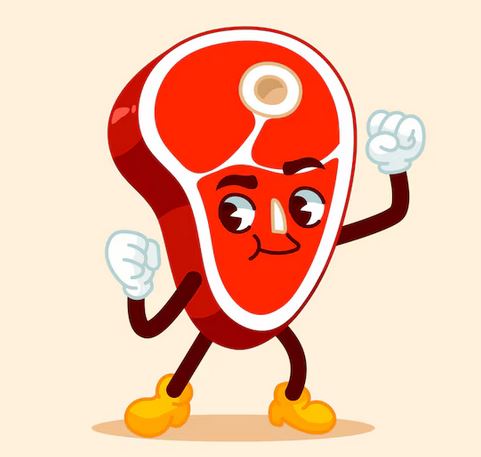as little as one hot dog a day
That still seems like a lot to me.
A hot dog a day keeps the doctors employed.
I suggest you don’t visit West Virginia…
Each year, West Virginians consume 481 hot dogs per capita, according to 24/7 Wall St. That means the average West Virginian eats more than one hot dog a day. Illinois locals love their Chicago dog, and they didn’t even come close to West Virginia’s annual hot dog consumption, hitting 317 per capita.
https://www.tastingtable.com/1887834/west-virginia-most-hot-dogs/
Coincidentally West Virginia has an obesity rate of 41%.
For as little as one hot dog a day, you could save this person from diabetes
The hot dog was supposed to be an example. A more common one is lunch meat, which some people do eat every day.
Fair point. My kid eats a lot of turkey sandwiches.
Anyone know the conversion rate of turkey slices to hotdogs?
Well if you roll up a Turkey slice its about the same size? Hard to say though, it varies by brand and region. Most of this stuff doesnt apply outside the US as much either as food standards tend to be very low in the states.
It’s also important to note that the studies included in the analysis were observational, meaning that the data can only show an association between eating habits and disease –– not prove that what people ate caused the disease
I think that if you know a person who eats a hot dog every day, you will have many other reasons to suspect that they’re unhealthy.
The hot dog was an example, lunch meat is also processed and plenty of people eat a sandwich every day.
Eh they’re mostly water and sawdust.
I’m not a nutritional epidemiologist.
But I’ve started to get into learning about it in the last few months.
It’s really starting to feel like this is a giant bullshit field, and as much as they are trying to find useful results, there’s something severely wrong with how they seem to arbitrarily assign causality and correlation.
In a contrived example: “People who live near power lines have more cancer” - “No, poor people live near power lines because they’re poor, and poor people have more cancer”
What are the kind of people that eat processed hot dogs? I can promise you they are not millionaires. I can promise you it’s not people who can afford filet mignon but decide to have a steamed hot dog. It’s not people who work out and take care of their bodies. It’s not people who cook.
So when a study is done like this, what answer are you actually getting? probably finding out that the type of people who eat processed meat are more prone to these conditions for a variety of considerations that are just totally left out of the analysis.
Basically: wanna live healthy and forever? Just become a billionaire! If you don’t want to live healthy then I guess that’s your choice to make.
We have collectively forgotten that correlation != causation
I actually don’t think it’s possible to forget. In the sense that pattern recognition and chain-of-event are thought structures baked into our very beings. We don’t intuit that most things are random in a greater sense, and probabilistic on a finer resolution. We’re always looking for self-satisfying, singular paths of causality and they don’t exist.
Touch red hot metal burn skin; Stab self in face make self not alive. A necessary abbreviated thought structure essential to human survival.
Extend that perspective to eat ween get beetus. Wait.
What is the field of nutritional epidemiology hoping to accomplish by obsessively searching for links (their magic word) between disease and dietary intake? It assumes, by the very nature of the question, that there is a direct causal relationship between diet & illness. There can’t be. Any sufficiently complicated system of interrelationships is going to have massive amounts of turbulence and chaos!
Yes, poor people eat poor quality food more often but the food is bad either way.
Here’s a good tip, look at allllll of the specific foods that a doctor would tell a pregnant person to avoid. Non-pregnant people should also avoid them, and processed meats have been on that list for a long time.
that’s not true. pregnant people are told to stay away from sushi because of immunity with raw fish. you should also not eat papaya while pregnant because it can cause premature contractions. you’re making a very broad generalization that the recommendation to pregnant people is completely nutrition based, but there’s many factors when growing a life inside you.
like in early pregnancy, you eat foods high in choline. that’s not because foods low in choline are bad for you, but because during early fetal development, choline builds neural tubes
Sure there are exceptions. You haven’t made any point about whether processed meats cause poor health outcomes though. They do, and its been shown over and over again, but people don’t like someone telling them they have bad habits.
that’s not the point i was addressing in my comment though, i agree processed foods a very bad. and poorer people are more likely to eat them. there’s no debate there from me.
i was only addressing your broad generalization of looking at all food doctors recommend for pregnant people to avoid. while it does include lots of bad and unhealthy foods, these recommendations also include foods that are directly related to fetal development, hormone changes, etc
Yeah I was being overly broad but its a good starting point still when looking to cut out unhealthy foods. People seem to understand why pregnant people shouldnt smoke or drink, I just think they should consider the foods they shouldnt eat either and why.
Try to follow the thrust of the conversation.
7% increase of an already small chance in exchange for 1 hotdog/day doesn’t sound that bad to me.
Jokes on them. I do tons of unsafe shit, and probably only one of those things is going to kill me. There will be no accountability for 99.9% of the bad behavior, including unregulated hotdog intake. Suckers.
For me, it’s about the quality of life before I die, not which shitty thing I’m willingly doing to my body that ends up “winning”.
Didn’t think it needed the /s, but maybe it always needs the /s
Considering humans have been eating processed meats like these for centuries, I think I’ll take my chances.
Nitrites only date back to the middle of the 19th century.
Isolated as a pure salt, maybe. All those “uncured” varieties listing celery as an ingredient are making use of the same compound though.
We’ve been smoking, salting, and otherwise preserving meat for way longer than that, though. People usually died off from other things before cancer got them, that’s all. The relatively high number of cancer deaths is a product of medical intervention getting so good and so widespread that we don’t regularly die of sepsis from stepping on a splinter or catching communicable disease anymore.
Absolutely, fuck cancer. But cancer went from being a minor concern to a relatively common one because we conquered so many other avenues of death, systematically and carefully, until we’re down to time, neglect and negligence as the three main ways humanity gets itself to the Reaper.
Dang, you mean to tell me that animal refuse blended into mush and saturated with salt is bad for us?!
Eh, “refuse” makes sausage sound worse than it is. In the modern world anyplace with a food inspection system will typically see sausage made from cuts of meat that are perfectly edible but don’t meet the grading standards likely to sell on the shelf , or the excess pieces of muscle left over after breaking primal cuts down into smaller pieces. No one wants to buy USDA certified Meh grade steak, or a palm sized wedge of uneven thickness. So they get sent off to make hamburger, sausage, and various canned or commercial meat products that don’t need to be pretty.
Processed meat also includes much more benign seeming foods, like sandwich meat, ground meats, and bacon. We’ve known for a while that eating meat, and more so red meat, is a risk for colon problems. Red meats are more likely to be processed and therefore cheap and salty.
The new thing the study adds is that there isn’t a lower bound. For a lot of things there’s a quantity that isn’t associated with any issues, and it’s only when you go above that limit that the risk goes up.
Truth.
Yesterday I opened a huge bung of ground beef that I got from Costco.
Fried up 1/3 of it up and when I tasted it… Damn that’s f’kking bottom round roast beef 😋
One of the other interesting things in the US is that different states can have different laws for meat standards, as long as they meet or exceed USDA minimums. They can’t, however, advertising that fact because it’s a violation of interstate trade.
So in the US, a legal hotdog ranges from a blend of the trimmings above and what can be removed from the bone with a power washer, up to “hot dogs must be made only of the product of primal cuts with no trimmings or waste meat”.I’m going to design and print a shirt that simply says
“Legal hotdog”
Refuse? Why do you think processed meat is animal refuse?
Ya well in the 70s and 80s this was what we as kids were given to eat.
I’m paying for that now
So I have to eat raw meat?
Mett gang assemble!
…and what do they say about just plain meat, I wonder? 🤔
I felt shitty, I made changes to my diet and exercise, I feel much better now.
It doesn’t take research to convince me that processed foods, especially industrial, large scale, profit-above-all-else, processed food is bad for me.
These results shouldn’t surprise anyone, and I don’t think they do. But, people will find excuses to keep doing unhealthy things they enjoy, and that is their prerogative.
Some of this food isn’t great for you, but if you only have it now and then it shouldn’t be a problem.
Moderation and a diverse diet is key.
YOLO 🤷♀️
I’m actually not surprised at all by the result of this study.
We know from several studies that fish 🐟 , eggs🥚, nuts 🌰 and chicken 🐔 are much healthier sources of protein than red meat 🥩.
From Cornell University:
Unprocessed red meat and processed meat consumption leads to a slightly higher risk of heart disease and premature death, according to a new study from researchers at Cornell and Northwestern University
https://news.cornell.edu/stories/2020/02/study-red-meat-processed-meat-hike-heart-disease-risk
From Harvard University:
People who eat just two servings of red meat per week may have an increased risk of developing type 2 diabetes compared to people who eat fewer servings, and the risk increases with greater consumption, according to a new study led by researchers from Harvard T.H. Chan School of Public Health.
“Given our findings and previous work by others, a limit of about one serving per week of red meat would be reasonable for people wishing to optimize their health and wellbeing” said senior author Walter Willett, professor of epidemiology and nutrition.
https://hsph.harvard.edu/news/red-meat-consumption-associated-with-increased-type-2-diabetes-risk/
From Oxford University:
Red and processed meat linked to increased risk of heart disease, Oxford study shows.
Overall, the evidence from the analysis indicated that each 50 g/day higher intake of processed meat (e.g. bacon, ham, and sausages) increased the risk of coronary heart disease by 18%.
Each 50 g/day higher intake of unprocessed red meat (such as beef, lamb and pork) increased the risk of coronary heart disease by 9%.
There was no clear link between eating poultry (such as chicken and turkey) and an increased risk of coronary heart disease.
I will continue eating that crap








